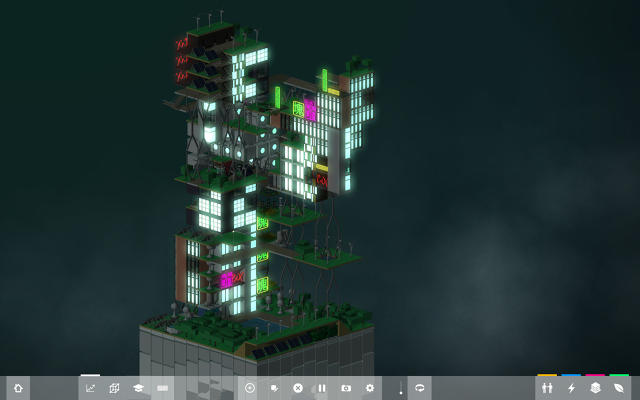Minecraft, Microsoft's explosively popular Lego-like world building game, has already inspired a whole generation of kids to become architects. Block'hood is a game that aims to do the same thing for a new generation of urban planners.
Block'hood was designed by Jose Sanchez, a Chilean architect-turned-University of Southern California School of Architecture associate professor-turned-game developer, who hopes his game will get people thinking about the delicate balance of resources and services necessary to create an ecologically and socially sustainable city.
Block'hood is a construction game, similar to SimCity, except the goal isn't to build a city: It's to build a city block—one that grows vertically like a Jenga tower. Unlike other construction games, money is no object in Block'hood; for all intents and purposes, you've got infinite cash to create the neighborhood of your dreams. What isn't infinite? Resources. Every rooftop garden, solar panel, school house, apartment, or cafe you install in your Block'hood depends on existing resources, regardless of those they create.
So as your Block'hood gets bigger, the resource network becomes exponentially more complex: If too much pollution from your neighborhood kills your rooftop garden, for example, you might not have enough food to feed your children. Soon, there aren't enough educated workers to staff your offices, which drives your economy to a halt. If this complex urban circuit fails, your entire block'hood might come crashing down—at which point, the only way to fix things is to rebuild.

Although Sanchez was a Minecraft player, there was a more suspiring inspiration for Block'hood: the Whole Earth Catalog, a legendary product catalog from the late '60s that focused on self-sufficiency and ecological sustainability. The idea here was that by buying the tools and learning the techniques listed in the catalog, you would have everything you needed to build your own society—a DIY guide for utopians.
"The Whole Earth Catalog was like this big list of tools and technology that you could have in your backyard which could solve any problem by being combined and recombined," Sanchez says. "I wondered if I could gamify that idea, by creating a catalog of things and simulating how they interact with each other," specifically, at an urban scale.

Sanchez says he has a two-fold agenda. Block'hood, he said, already situates itself into the legacy of sandbox construction games, like Will Wright's Sim games. But that's not necessarily the audience he wants Block'hood to reach. "This game has the ability to reach a different kind of audience," he says. It could be used in city councils, he says, to show the effects of new zoning plans, or in classrooms to teach kids how urban planning works, so they can see what happens in a neighborhood without enough water, or a particular social dynamic.
Right now, Sanchez is just trying to finish all the planned features for the game, but he's already exploring the idea of releasing an education-only version. Long after Block'hood stops selling to gamers, he imagines it being used to teach the next generation of urban planners in classrooms.

The model of urban planning Sanchez is advocating for with Block'hood is about sustainability. "It's about understanding ecological relationships," Sanchez says. "In the game, there's no such thing as waste, as long as it can be used. Once you learn this way of thinking, the city and world we live in starts looking very differently." At the very least, Sanchez hopes he'll get people thinking about the ways in which a city's resources are interconnected. "Somehow we live in a world where you flush your toilet and you have no idea where it ends up, and I think that's absurd."
After two years of development, Block'hood is currently available as part of an open beta for PC and Mac (it can be purchased for around $10 here). Just like planning a real city, there's no real way to "win" it. It just keeps on evolving forever, and the best you can hope for is you manage to stave off chaos and disrepair for as long as you possibly can.